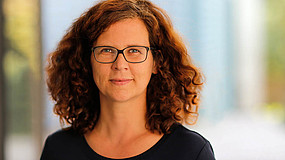The last Coke in the desert
Schulze says that this outdated idea of: "We as a university hold the knowledge, send it into the desert where people are thirsty for knowledge, and then we tell the companies how to do it", no longer applies. Large companies have long been conducting their own research in their fields.
Apparently, it's not the one idea - it's the practice that needs people like Mandy Schulze and her practical knowledge. "We should be aware of the role of a regional university. And together," says Schulze. Continuing academic education is one way of dealing with problems and uncertainties. "We know what's going on regionally." Opening up universities to continuing education degrees can establish modern science - "That's my favorite topic," says Schulze. "That's where the future lies."
It sounds as if Schulze already has the solution. "How can we solve problems without having a solution? What we need to do is put on our theoretical glasses and take a transdisciplinary look at things from different perspectives and clarify them." The university must ask itself: what is our mission - what social problems do we want to solve with the university?
Oberlausitz-Transfer
One question follows the next. And these are big questions that Schulze asks herself. How do we get science into society and vice versa? What does practice-based knowledge look like? How can universities address social issues and transfer knowledge? What makes academic continuing education academic continuing education? What should such a program look like? And finally, perhaps the most important question is: How can this fit in with our socio-ecological system in Upper Lusatia?
In 1988, Zittau's former engineering university was granted the status of a technical university, and had previously been granted the right to award doctorates. It lost this again with the reorganization of the Saxon higher education landscape after reunification and was downgraded to a university of applied sciences. "That does something to the region," says Schulze. She herself left her home shortly after reunification. In 2010, Schulze and her fellow campaigners founded the 3rd Generation East Germany initiative. They were awarded the Gustav Heinemann Citizens' Prize in 2013 and the Theodor Heuss Medal in 2020. With Perspektive3, Mandy Schulze wants to support the participation of her generation in the change in East Germany - to enter into a learning process, into a dialog.
How do we position ourselves as a university of applied sciences in the higher education landscape?" "How far do we want to open up? How can we talk about corporate structures and social conditions in our region? We need to enter into a relationship, into a discourse, says Schulze. "And not just by someone standing at the front and explaining their scientific studies with a PowerPoint presentation. We need to find other ways of talking to each other and working in a more application-oriented way."
Studying to become yourself
A certain teaching basis is needed, says Schulze. "Of course we have to convey certain perspectives from a specialist context in our teaching. That's also what I mean by science." Her students should also develop a certain attitude. "I will argue with them," but that is not a fixed educational canon. "The students don't just need me as an input provider who stuffs them full of knowledge. They need someone to ask questions with them." It takes those seven semesters, says Schulze, "until you grab your topic, write your Bachelor thesis and pour everything you've learned into it. In the end, someone has made themselves their own by developing their own perspective."
"The students don't just need me to give them input and fill them with knowledge. They need someone to ask questions with them."
Mandy Schulze says, "I enrich them with my perspective on networks." In addition to teaching, she is also involved in research into her topics - she is looking forward to this exciting time of transformation processes. "Just like at the time of reunification, structures have broken away and new ones are emerging." Schulze encourages people to make use of this (uncertain) time: what is available for community work? How much of my knowledge can I use? And what not? Who do I coordinate with, or not? "We can't say what will happen next. It could all be completely different. There is an uncertainty that we have to endure. A learning process in modern times - and it has to have a bit of pepper and chili!"
The interview was conducted by Sophie Herwig


